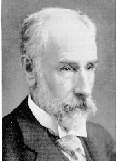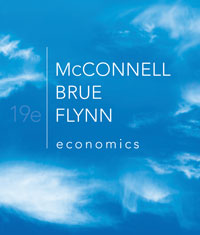Economics (McConnell) AP Edition, 19th EditionChapter 7:
Businesses and the Costs of ProductionOrigin of the Idea <a onClick="window.open('/olcweb/cgi/pluginpop.cgi?it=gif::::/sites/dl/free/0217511447/124310/origins_image.gif','popWin', 'width=70,height=90,resizable,scrollbars');" href="#"><img valign="absmiddle" height="16" width="16" border="0" src="/olcweb/styles/shared/linkicons/image.gif"> (1.0K)</a> <a onClick="window.open('/olcweb/cgi/pluginpop.cgi?it=gif::::/sites/dl/free/0217511447/124310/origins_image.gif','popWin', 'width=70,height=90,resizable,scrollbars');" href="#"><img valign="absmiddle" height="16" width="16" border="0" src="/olcweb/styles/shared/linkicons/image.gif"> (1.0K)</a> | 7.1 Law of Diminishing Returns |  <a onClick="window.open('/olcweb/cgi/pluginpop.cgi?it=gif::::/sites/dl/free/0217511447/124310/origins_image.gif','popWin', 'width=70,height=90,resizable,scrollbars');" href="#"><img valign="absmiddle" height="16" width="16" border="0" src="/olcweb/styles/shared/linkicons/image.gif"> (1.0K)</a> <a onClick="window.open('/olcweb/cgi/pluginpop.cgi?it=gif::::/sites/dl/free/0217511447/124310/origins_image.gif','popWin', 'width=70,height=90,resizable,scrollbars');" href="#"><img valign="absmiddle" height="16" width="16" border="0" src="/olcweb/styles/shared/linkicons/image.gif"> (1.0K)</a> | 7.2 Production Relationships |  <a onClick="window.open('/olcweb/cgi/pluginpop.cgi?it=gif::::/sites/dl/free/0217511447/124310/origins_image.gif','popWin', 'width=70,height=90,resizable,scrollbars');" href="#"><img valign="absmiddle" height="16" width="16" border="0" src="/olcweb/styles/shared/linkicons/image.gif"> (1.0K)</a> <a onClick="window.open('/olcweb/cgi/pluginpop.cgi?it=gif::::/sites/dl/free/0217511447/124310/origins_image.gif','popWin', 'width=70,height=90,resizable,scrollbars');" href="#"><img valign="absmiddle" height="16" width="16" border="0" src="/olcweb/styles/shared/linkicons/image.gif"> (1.0K)</a> | 7.3 Minimum Efficient Scale and Natural Monopoly |
 <a onClick="window.open('/olcweb/cgi/pluginpop.cgi?it=gif::::/sites/dl/free/0217511447/124310/origins_image.gif','popWin', 'width=70,height=90,resizable,scrollbars');" href="#"><img valign="absmiddle" height="16" width="16" border="0" src="/olcweb/styles/shared/linkicons/image.gif"> (1.0K)</a> <a onClick="window.open('/olcweb/cgi/pluginpop.cgi?it=gif::::/sites/dl/free/0217511447/124310/origins_image.gif','popWin', 'width=70,height=90,resizable,scrollbars');" href="#"><img valign="absmiddle" height="16" width="16" border="0" src="/olcweb/styles/shared/linkicons/image.gif"> (1.0K)</a> | 7.1 Law of Diminishing Returns |
The law of diminishing returns is one of the oldest concepts in economic theory. The first recorded expression of the law was by Anne Robert Jacques Turgot (1727-1781). Born in France and descending from a long line of state officials, Turgot worked his way up in government service, becoming the French finance minister in 1774. He was a member of the Physiocratic school of economics, an influential but short-lived (20 years) branch of economic thought. The Physiocrats believed, among other things, in the preeminence of agriculture. Production from the land was the only way to increase the wealth of the nation. All other economic activities (for example, manufacturing) merely rearranged the inputs without adding any value. While for Turgot agriculture was the only way to increase wealth, he also saw limits to how much a nation could increase its output by increasing expenditures on agriculture. As Turgot expressed it:
The earth's fertility resembles a spring that is being pressed downwards by the addition of successive weights. If the weight is small and the spring is not very flexible, the first attempts will leave no results. But when the weight is enough to overcome the first resistance then it will give to the pressure. After yielding a certain amount it will again begin to resist the extra force put upon it, and weights that formerly would have caused a depression of an inch or more will now scarcely move it by a hair's breadth. And so the effect of additional weights will gradually diminish.(1)
The next economist to develop and apply the law of diminishing returns was the Reverend Thomas Malthus (1766-1834). Malthus was born near Dorking, England, studied at Jesus College, Oxford, and was ordained a minister by the Church of England. A classical economist, Malthus also became the first professional economist, teaching history and political economy at Haileybury College.
Like the Physiocrats, Malthus applied the notion of diminishing returns to agriculture. He stated: When acre has been added to acre till all the fertile land is occupied, the yearly increase of food must depend upon the melioration [improvement] of the land already in possession. This is a fund which, from the nature of all soils, instead of increasing, must be gradually decreasing.
Malthus introduced the idea when constructing his famous population theory. The theory argues that population grows geometrically, while food production can, at best, increase arithmetically. The eventual result is that the population outgrows its food supply, and people are forced to live at subsistence. The limits to food production stem from diminishing returns.
David Ricardo (1772-1823), another classical economist and close friend of Malthus, also contributed to developing the law of diminishing returns. Referring to it as the "intensive margin of cultivation," Ricardo demonstrated how the addition of labor and capital to a fixed piece of land would yield successively smaller increases in output. In the absence of diminishing returns, as the text states, you could grow the world's food supply in a flower pot. Ricardo used diminishing returns to explain his theory of rent. If prices for agricultural output are based on the cost of producing on the most intensively used land, the surplus accruing to less intensively used land becomes rent for the land owner.
Born to Jewish immigrants who migrated from Holland to England, Ricardo began his training at his father's stock brokerage at the age of 14. Despite being temporarily disowned by his father for marrying a Quaker woman, Ricardo used his knowledge of the stock market to accumulate a small fortune. Part of his success he attributed to his stock market theory, which was that people exaggerate the importance of events. If Ricardo saw reason for a small increase in a stock price, he would acquire a position in the stock knowing that people would buy the stock until it was overvalued, at which point he would sell. Ricardo had many other contributions to economic theory, including his theories of comparative advantage, exchange value, and income distribution.
- Anne Robert Jacques Turgot, Observation sur un Memoire de M. de Saint-Peravy (1767), ed. Gustave Schelle, Oeuvres de Turgot et Documents le Concernant, vol. 2 (Paris: Librairie Felix Alcan, 1914), p. 644.
 <a onClick="window.open('/olcweb/cgi/pluginpop.cgi?it=gif::::/sites/dl/free/0217511447/124310/origins_image.gif','popWin', 'width=70,height=90,resizable,scrollbars');" href="#"><img valign="absmiddle" height="16" width="16" border="0" src="/olcweb/styles/shared/linkicons/image.gif"> (1.0K)</a> <a onClick="window.open('/olcweb/cgi/pluginpop.cgi?it=gif::::/sites/dl/free/0217511447/124310/origins_image.gif','popWin', 'width=70,height=90,resizable,scrollbars');" href="#"><img valign="absmiddle" height="16" width="16" border="0" src="/olcweb/styles/shared/linkicons/image.gif"> (1.0K)</a> | 7.2 Production Relationships |
The theoretical relationships between inputs and total product were developed by several economists. But it was Francis Edgeworth (1845-1926) who first explicitly distinguished between the average and marginal products of a variable resource, given a fixed resource. Born in Ireland, he attended Trinity College in Dublin before moving on to study at Oxford. Edgeworth spent his career at Oxford as the Tooke Professor of Political Economy. He also served for 35 years as the editor of the Economic Journal, and for a term as president of the Statistical Society.
Edgeworth is described as a marginalist, and he was one of many economists who developed and emphasized the tools of marginal analysis in economic theory. In addition to his work on the product curves, Edgeworth contributed significantly to the development of indifference curves, the theory of exchange, and models of imperfect competition. He also helped to popularize the use of mathematics in economics.
|
 <a onClick="window.open('/olcweb/cgi/pluginpop.cgi?it=jpg::::/sites/dl/free/0217511447/124320/origin22_2.jpg','popWin', 'width=166,height=231,resizable,scrollbars');" href="#"><img valign="absmiddle" height="16" width="16" border="0" src="/olcweb/styles/shared/linkicons/image.gif"> (24.0K)</a> <a onClick="window.open('/olcweb/cgi/pluginpop.cgi?it=jpg::::/sites/dl/free/0217511447/124320/origin22_2.jpg','popWin', 'width=166,height=231,resizable,scrollbars');" href="#"><img valign="absmiddle" height="16" width="16" border="0" src="/olcweb/styles/shared/linkicons/image.gif"> (24.0K)</a> |
Photograph courtesy of: Cambridge University Press 1985, Mark Blaug, Great Economists Before Keynes
 <a onClick="window.open('/olcweb/cgi/pluginpop.cgi?it=gif::::/sites/dl/free/0217511447/124310/origins_image.gif','popWin', 'width=70,height=90,resizable,scrollbars');" href="#"><img valign="absmiddle" height="16" width="16" border="0" src="/olcweb/styles/shared/linkicons/image.gif"> (1.0K)</a> <a onClick="window.open('/olcweb/cgi/pluginpop.cgi?it=gif::::/sites/dl/free/0217511447/124310/origins_image.gif','popWin', 'width=70,height=90,resizable,scrollbars');" href="#"><img valign="absmiddle" height="16" width="16" border="0" src="/olcweb/styles/shared/linkicons/image.gif"> (1.0K)</a> | 7.3 Minimum Efficient Scale and Natural Monopoly |
Piero Sraffa (1898-1983), an Italian-born economist, developed the idea of natural monopoly. He migrated to England, where he became a student of Alfred Marshall (1842-1924), and later a teacher, at Cambridge. In 1940, when Germany began the blitzkrieg into France, Sraffa was interned by the British as an enemy alien. John Maynard Keynes denounced the ill treatment of distinguished refugee scholars such as Sraffa, writing, "If there are any Nazi sympathizers still at large in this country, we should look in the War Office and our Secret Service, not in the internment camps."
Sraffa observed that in some production processes, average costs fall as output expands. He wrote:
Everyday experience shows that a very large number of undertakings—and the majority of those which produce manufactured consumers' goods—work under conditions of individual diminishing costs. Almost any producer of such goods, if he could rely upon the market in which he sells his products being prepared to take any quantity of them from him at the current price, without any trouble on his part except that of producing them, would extend his business enormously. It is not easy, in times of normal activity, to find an undertaking which systematically restricts its own production to an amount less than which it could sell at the current price, and which is at the same time prevented by competition from exceeding that price. Business men, who regard themselves as being subject to competitive conditions, would consider absurd the assertion that the limit to their production is to be found in the internal conditions of production in their firm, which do not permit of the production of a greater quantity without an increase in cost. The chief obstacle against which they have to contend when they want gradually to increase their production does not lie in the cost of production—which, indeed generally favours them in that direction—but in the difficulty of selling the larger quantity of goods without reducing the price, or without having to face increased marketing expenses.(1)
Given a limited market demand for output, Sraffa concluded that efficiency concerns would lead to a decreasing number of firms in the industry, with the extreme possibility of a natural monopoly. This idea ran contrary to the popular belief that markets operated more in accord with perfect competition. In perfect competition, rising marginal and average costs limit how much output one firm can profitably sell in the market. With a natural monopoly, the firm is limited only by the size of the market, which is in part a function of the prices set by the monopoly.
Sraffa's work on natural monopolies was consistent with neoclassical economics, the conservative mainstream in economics. Later years would see a dramatic shift in Sraffa's thinking, as he became a leading figure of the more radical post-Keynesian school of economic thought.
|  <a onClick="window.open('/olcweb/cgi/pluginpop.cgi?it=jpg::::/sites/dl/free/0217511447/124320/origin22_3.jpg','popWin', 'width=430,height=323,resizable,scrollbars');" href="#"><img valign="absmiddle" height="16" width="16" border="0" src="/olcweb/styles/shared/linkicons/image.gif"> (66.0K)</a> <a onClick="window.open('/olcweb/cgi/pluginpop.cgi?it=jpg::::/sites/dl/free/0217511447/124320/origin22_3.jpg','popWin', 'width=430,height=323,resizable,scrollbars');" href="#"><img valign="absmiddle" height="16" width="16" border="0" src="/olcweb/styles/shared/linkicons/image.gif"> (66.0K)</a> |
- Piero Sraffa, "The Laws of Returns under Competitive Conditions," Economic Journal 36 (December 1926) p. 543.
Photograph courtesy of: (c)Corbis # MAN0026;  |  |



















